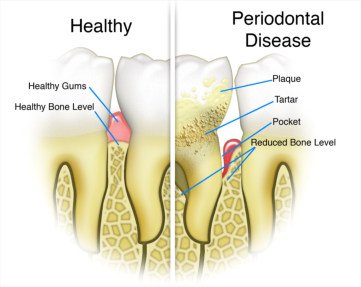Periodontal disease is an epidemic around the world and in the U.S., so it makes sense that there are numerous causes of the condition. Primarily, poor oral hygiene is responsible for the development and progression of periodontal disease, as it is both treatable and manageable under the care of a dentist trained in periodontal care.
Periodontal disease is caused by bacteria that accumulate on the teeth, forming a sticky film known as plaque. With proper daily brushing and flossing habits, this film is washed away, preventing bacteria from proliferating around the gum tissues. Twice-yearly professional teeth cleanings can help eliminate built-up plaque and tarter in places missed by a tooth brush, preventing periodontal disease.
However, missing any area of the tooth – especially those in between teeth and near the surface of the gums – can lead to a hardening of the plaque on the teeth. Overtime, bacteria grow in these areas, not only decaying teeth but causing damage to the soft tissues and bone that support the teeth. Failing to maintain regular professional cleaning appointments will allow the disease to further progress, eventually leading to inflammation, bone deterioration and tooth loss.



